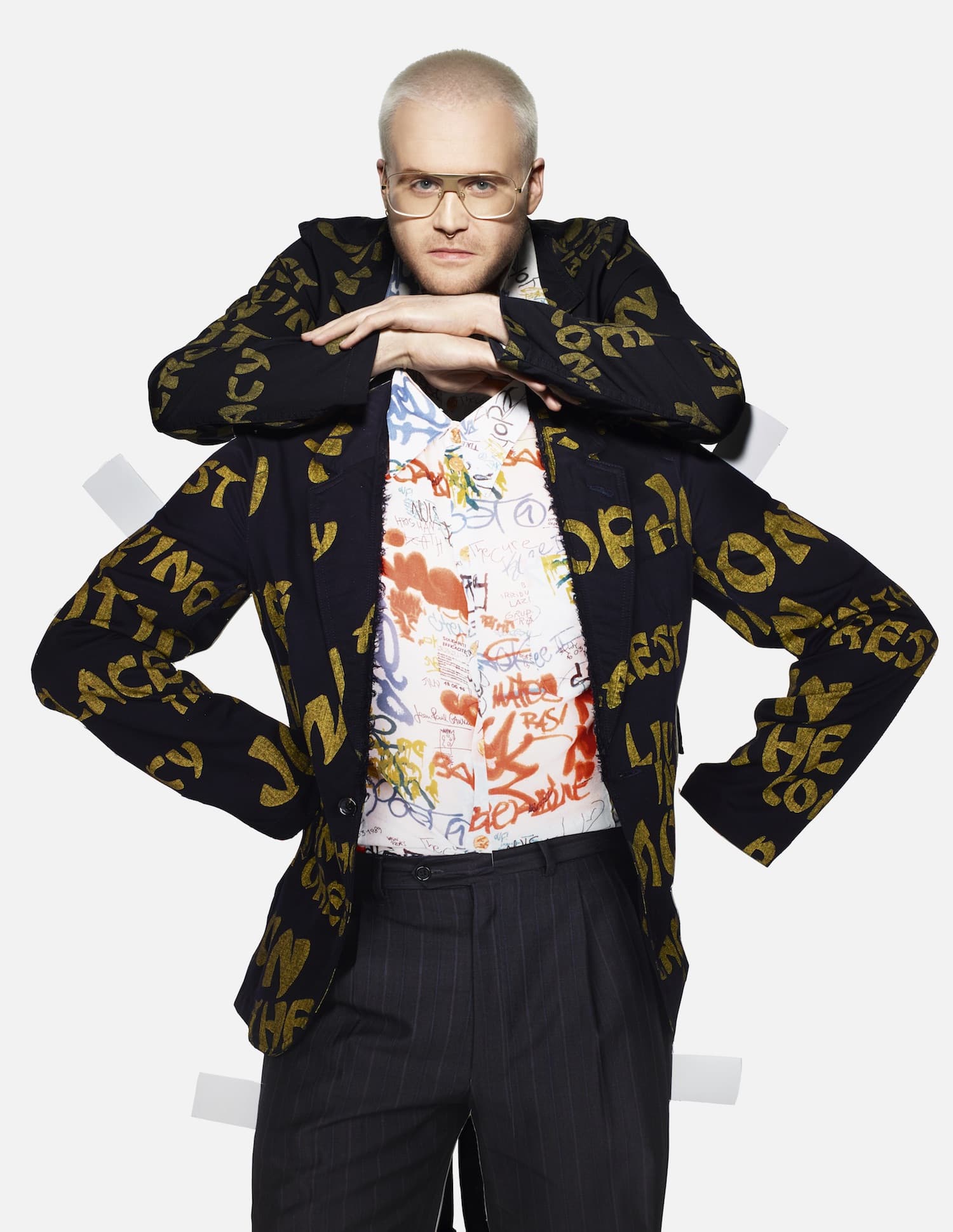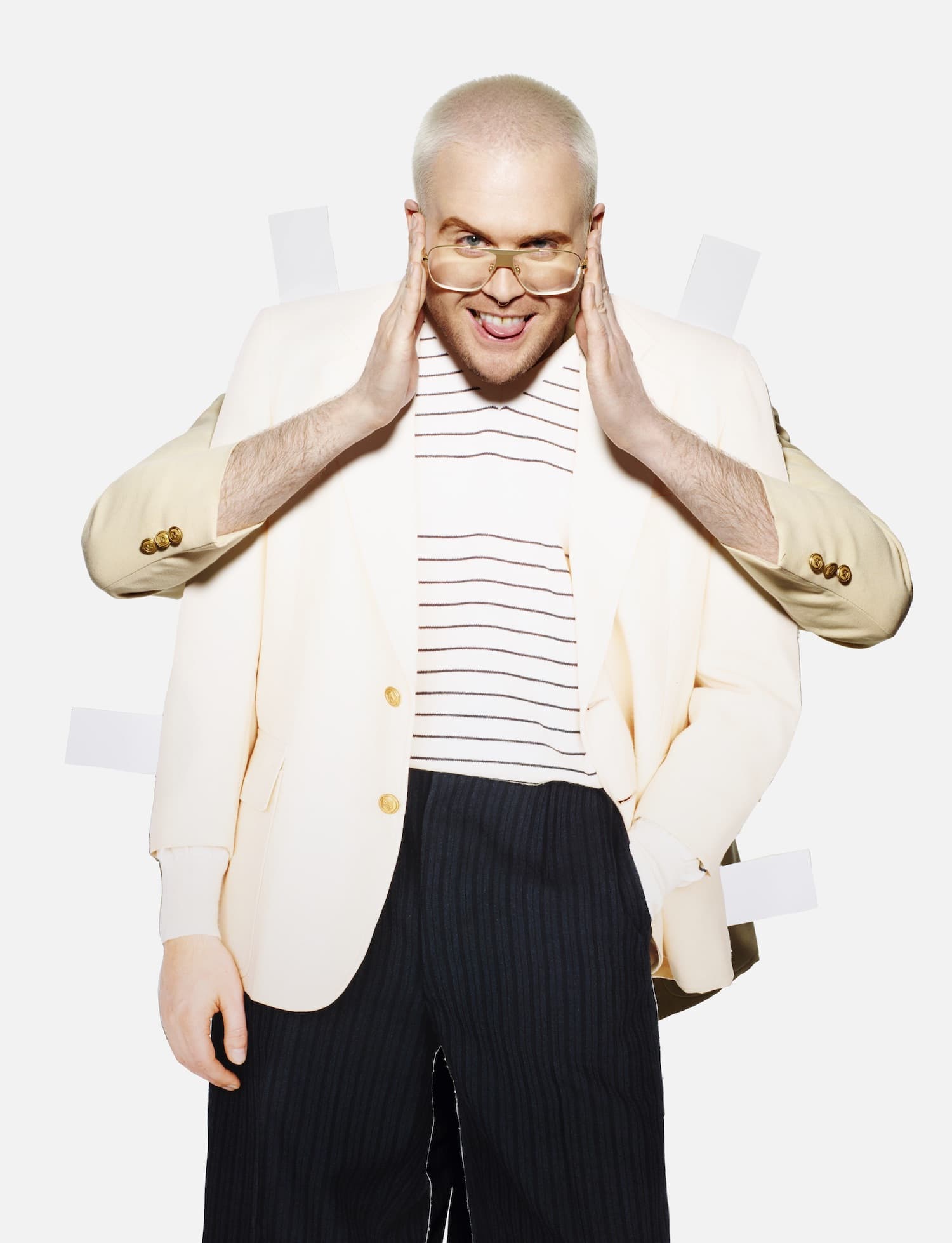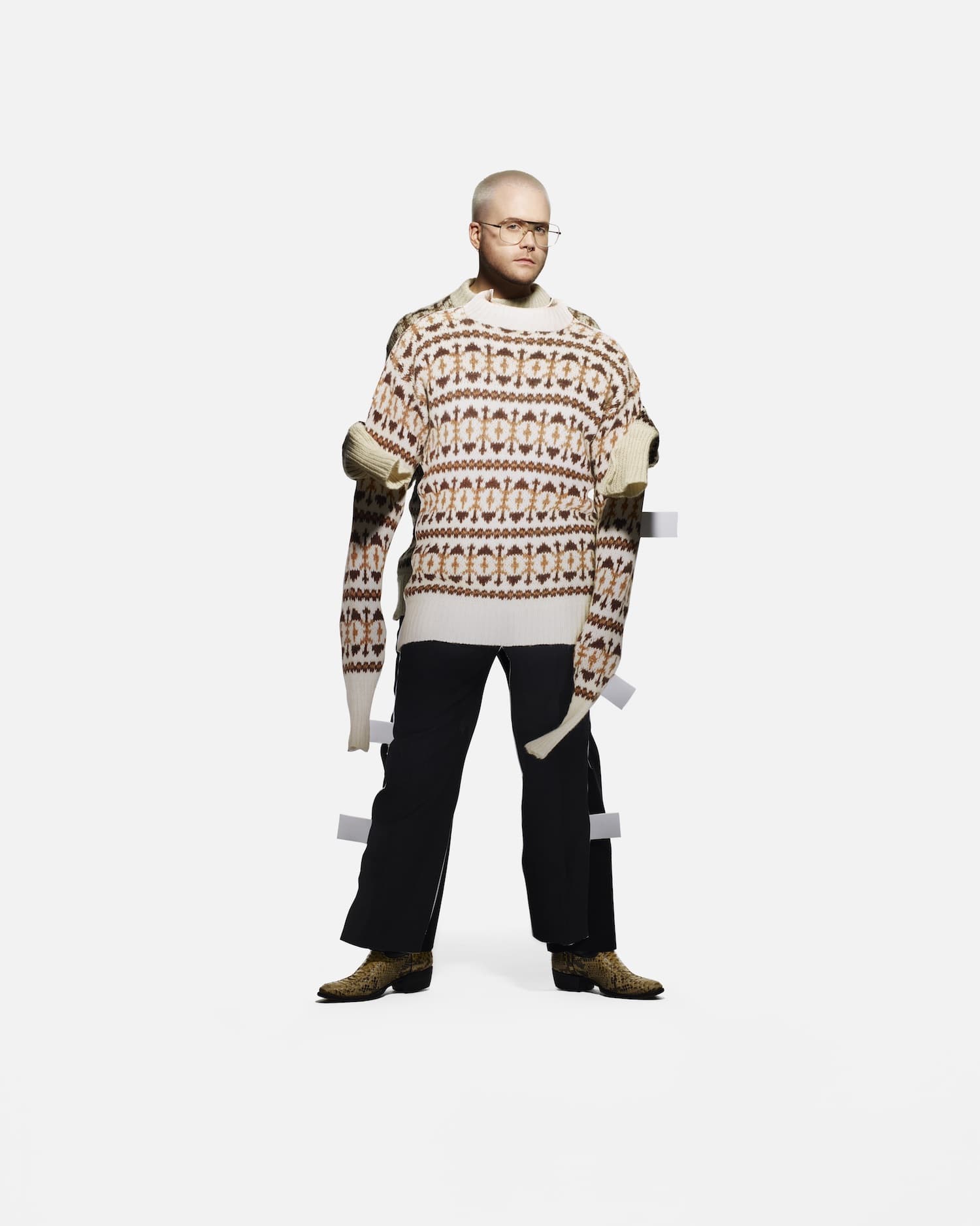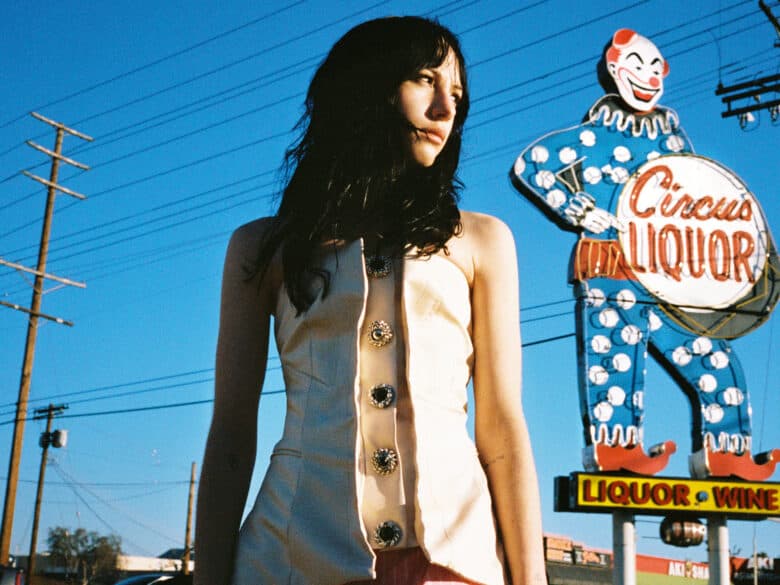The Future: Christopher Wylie
The Millennial whistleblower rose to fame in 2016, following the Cambridge Analytica scandal. Now banned from Facebook, along with its associated products, Christopher Wylie has detailed his account of the time in his memoir Mindf*ck. He shares his thoughts on what it’s like to be a whistleblower out in the wild – from clubbing and dating, to why the fashion industry isn’t prepared for its algorithmic future.

I’m interested to know what your life is like now – post-Cambridge Analytica, post-Senate hearing, post-book launch. What are your days like?
Transient. I feel like I’m in a transition in my life, between two sort of worlds and moments. Because I’m travelling so much, I also feel physically transient.
But you’re based in London?
That’s where I pay my rent. This past month I’ve been to New York twice, LA, Stockholm, London. I love London. I’ve lived here on and off for 10 years now. I don’t feel English but I do feel like a Londoner. I have strong opinions about public transport and stuff.
In your book Mindf*ck, you write about being a student in London – how you felt embraced by the Central Saint Martins [CSM] art scene, club nights, and Sink the Pink parties. Are you still going clubbing?
I’ve not gone clubbing in months. That’s simply because I’ve been working and releasing a book and [public] speaking – your free time becomes quite precious. When I have a weekend free in London, usually I’m too jetlagged or tired to do anything and I want to do laundry first. So I feel like I’ve become old really quickly.
You’re 30, right?
I’m over the hill. So it’s all downhill from here.
What’s it like to go clubbing as a whistleblower?
You definitely get lots of “Will you blow my whistle?” I’ve heard it so many times now. It’s the same on Grindr, Tinder, whatever.

What about the love life of a whistleblower? Can you be on Tinder?
My Tinder stopped working. I wasn’t blocked but Tinder uses Facebook authentication, so you get blocked by proxy. In Tinder’s eyes, if you don’t have a Facebook account, you’re not a person. A lot of apps work that way – they use your Facebook identity as a credential to authenticate you. So if you get banned from Facebook, it’s like having your papers removed. You’ve been sort of deported.
You’re banned from Instagram as well.
Yeah, because it’s owned by Facebook. I can’t use Instagram, Facebook, WhatsApp, or anything that touches the Facebook universe – I am not a welcome person.
How does that feel?
It’s kind of annoying. Lots of people want me to say, “Yeah, my life is so much better without Facebook products.” But the reality is really annoying because Instagram isn’t just well-curated pictures of avocado toast, it’s how people talk to each other, it’s how people follow stuff, it’s subculture. Party invites don’t happen on Twitter. Twitter is a place for angry old people to rant about Brexit. Maybe that’s why I’ve become old, because I’m surrounded by Boomers on the internet.
So it is socially isolating to a degree?
To a degree. Don’t get me wrong, these are luxurious problems to have – you can take my white girl tears with a grain of salt. Far worse things happen to other people who blow the whistle. I will take my slightly annoying barrier to a social life compared to the other options.
In your book, you make a correlation between whistleblowing and being queer.
Yes, because being queer is about being real with the world, even if you’re presenting an uncomfortable truth. Whistleblowing is similar. I don’t think it’s surprising that a lot of whistleblowers or journalists who challenge authority are queer. You grow up being more comfortable with making other people uncomfortable – even if those people are in a position of power or authority and can exercise that against you. Being a whistleblower has its own process of coming out, too. To me, whistleblowing is a radical queer act.

You’re always labelled as the “pink-haired, Millennial whistleblower” by the media. Does that feel right?
I got told by a lot of people to un-dye my hair and I was like, “Fuck no.” If you think about it – how weird 2016 was and how the post-2016 world is so weird – to have a weird-looking guy start to explain it, it kind of fit, in a way. A lot of people thought I should have worn a suit, taken out my nose ring, dyed my hair and looked very straight. Well, I’m not straight and I don’t do anything straight. Sorry, honey, that’s not what it’s going to look like.
And The New Yorker called you “an oracle of the future”?
Yeah, the “pink-haired, nose-ringed oracle whatever”. I do kind of feel like an oracle, though. Not intentionally, but I spend a lot of time talking about how doomsday could happen. I did an event last year in Greece, in Delphi, where the actual oracle used to be. And I literally felt, “I’m an oracle.”
I wanted to ask you about something I heard the theorist McKenzie Wark say – how the public should start referring to AI as “data management”, because that’s essentially what it is. By calling it data management, this technology stops being some dystopian future that’s out of our hands, but something we can pressure authorities into regulating.
Silicon Valley deliberately obfuscates a lot of what it does with language, to make things sound unattainably complicated. For example, an algorithm is just a way of recognising and reacting to patterns that have been observed in the past. When you cross the street because you see the lights turning red, even though there are cars coming, because you’ve done that so many times, you have a high degree of confidence the cars will stop. You’re literally risking your life based on prior assumptions. That’s an algorithm. The mechanics and the math are complicated but so are fluid mechanics in a car. You still understand that fuel goes in, shit burns, it spins the wheels, and it goes. One of the things that drives me crazy is when I talk to people or regulators or companies, and they talk about AI and digitisation as a thing in the future. It’s fucking here now. It’s not a future thing. The future is now.

You’re working for H&M now. Do you hear these conversations playing out in the fashion industry?
I am so deeply unimpressed by the level of discourse in that industry. Right now, fashion is the number one target for companies like Amazon. Amazon competes on personalisation, segmentation, efficiency, and optimisation. Amazon’s business model ultimately is to simply become the economy. It’s trying to become the rail networks of 150 years ago – in North America, or even here, if you were on the rail networks, you could own industry.
Amazon started in books and it moved into fast-moving consumables, then entertainment, and it’s now looking at fashion. Fashion is something that everyone buys around the world – it’s a regular purchase and it’s a highly segmented market, which lends itself to the kinds of personalisation algorithms that Amazon is really good at. When you talk to companies in fashion, people care more about what Raf Simons is doing than what Jeff Bezos is doing. Wake up! I don’t give a fuck about what Raf Simons is doing. I give a fuck about what Jeff Bezos is doing.
What do you see happening in fashion in the next 10 years?
I see Amazon. I see Jeff Bezos becoming the next Anna Wintour. I don’t say that flippantly. The algorithm on Amazon decides whether your book does well or not. As they enter fashion, it’s going to be the same. Amazon’s algorithm will become the most important tastemaker.
That sucks because a society that dances around a construction of code is kind of lame. But at the moment that’s what I see. And I don’t see any preparation for that. I talk to designers and they say, “That’s not my job.” Even CEOs and senior people at big fancy brands talk about tech disruption as if it’s not going to hit fashion, as if fashion is somehow immune.
Where do you think that denial comes from?
It comes from a self-referential culture. It comes from an industry that is mostly run by white European men of a certain generation and a certain background. I’ve met people in fashion who have never used Amazon. For them, it’s like this thing that other people do.
Is there anybody or anything that excites you in the fashion industry at the moment?
Working at H&M, I do find it exciting that there’s an opportunity to do better and to use cultural insight and data to try to solve some fundamental problems. If you can work on solutions to those problems you can make an impact. But I don’t spend my days obsessing over the shows. The shows are irrelevant. It is just a giant ego wank. The dirty secret is most people in fashion don’t even watch them. It’s literally so that executives can flirt with Timothée Chalamet and fancy people … as the world burns around them.
I fucking hate all of this bullshit about sustainability, particularly in the luxury sector – the idea that somehow some plant leather is going to save the planet, or is more sustainable. The thing I think the fashion sector should be worried about when it comes to climate change is that its biggest raw material is a plant. It’s cotton. Cotton needs water, a certain temperature, a certain amount of sunlight. The regions it currently grows in are susceptible to becoming arid. I don’t want a future where we are boiling to death and we have to use polyester. That’s going to be a hot, sweaty mess.

The shaming around fast fashion also has a class element – the working-class people who “can’t control their bingeing”, when often they’re buying clothes to wear at work or for their family.
The temperance movement at the turn of the last century had the same narrative about alcohol – all these working-class people who are dirty and drunk and can’t control themselves. Even though it’s because you’ve put them in a structure where they don’t have elements of control. It’s the innate structure of classicism. I went to an event at the British Fashion Council last summer and there were people drinking champagne and talking about how we should ban fast fashion and people should invest in quality. I just flipped my shit. They’re so out of touch and in the bubble of privilege that they don’t get it. At H&M we work in more than 70 markets. That’s a lot of places that don’t necessarily have the same economic development. Do they not deserve clothes?
What are your thoughts on Extinction Rebellion’s recent call to #BoycottFashion?
I went to an Extinction Rebellion event where they said everybody should boycott and shut down fast fashion. I asked one of the organisers a really simple question – if you look at a country like Bangladesh, where one of their largest sectors is apparel manufacturing – same with China, India, Africa – what do we do about the mostly women of colour who currently depend on that for their livelihoods? And live in places where there isn’t social support or Jobseeker’s Allowance? It can be quite devastating to someone to lose that job. The response was, “Well, those countries should create systems to support those people.” Of course that’s what a white European woman is going to say. But the world doesn’t work like that.
Has your own relationship with clothes changed since working at H&M?
When you take courses at CSM or LCF, all of the examples that are given are from luxury. They should really call their course “luxury fashion” not “fashion”. People dismiss the largest section of fashion as somehow not important. I’ve learned a lot about manufacturing clothing for the world. A lot of people will ask me about the AI and data elements of my job, and there is a big tech part, but I feel more like an anthropologist than anything else. Machine learning cannot capture human nuance, at least not at the moment. It can’t help you necessarily learn culture. I’m working on projects to better understand not just the sizes of people, but the shapes of people – and that’s really cool. It’s a healthy use of data and AI to better understand the realities of the shapes of people around the world so that you can actually make things that fit and look good.
Do you think the regular shopper has acclimatised to clothing that doesn’t really fit, or they never knew in the first place?
We tolerate trying to fit to clothes rather than clothes trying to fit to us. The industry is ready to be disrupted. Hello, you clothes people. It’s not just about sizing – everybody talks about size inclusivity. It’s about shape. Shape inclusivity. Even the conventional wisdom of the apple shape, pear shape, watermelon shape, whatever – there’s been no, what we would call in data science, “unsupervised clustering” of shapes.
Would you say you’re a pessimist or an optimist?
When it comes to a lot of things, I recognise that I do sound and think in a really pessimistic way, but personally I’m very optimistic. I’ll look at the trajectory of something and go, “That’s fucked up, but we can change it.” We just have to do stuff. I don’t know what’s going to happen – that’s what makes everything so exciting.

